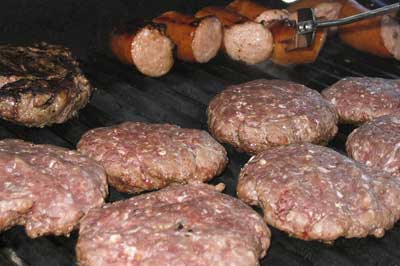Ancient Olympians on the Atkins Diet (776 BC)
![The ancient training grounds at Olympia.] The ancient training grounds at Olympia.]](http://ancientstandard.com/images2/palaestra.jpg)
While the modern-day Olympics have certainly changed since their inception in 776 BC, one thing has certainly remained the same: all athletes, past and present, have been concerned with their diet. An athlete’s mealtime can make or break his performance, which the ancient Greeks were well aware of. In fact, food historians are realizing that the diet of the first Olympians wasn’t that far off from what people in the 21st century would identify with the popular “Atkins” diet!
There are a wealth of Greek and Latin texts, such as The Deipnosophists – or in English,The Philosopher’s Banquet – which is a 15-volume tale of a long feast that was written around 200 AD, wherein food origins and quality are discussed at length. This tale, written by a Greek named Athenaeus, centers around a banquet where diners talk extensively about all different kinds of food and where it came from – and not only that, but each character provides the ancient literary source for their own words! Essentially, it’s an ancient document wherein the characters talk about food using quotes from other real, ancient documents.
Unfortunately, out of the 1,500 documents that were cited in the work, only 15 still survive. Still, these documents provide valuable insight into ancient Mediterranean cuisine and how it was prepared.
For most people, a regular diet would consist of items like bread, fruit, and vegetables, while fish was the primary meat source for an average citizen. But Olympians, who typically came from the upper social classes in ancient Greece, had families who could afford to feed their children heartier meats and other protein-rich foods that helped to condition and build muscle.

 Although the earliest reports of Olympic diets seemed to center around eating mostly cheese and fruit, the focus was shifted toward meat somewhere along the way. Apparently, this happened after one ancient Olympic runner won multiple competitions after eating a meat-only diet – which naturally started a copycat craze. The athletes were also advised to avoid eating bread right before their competition, and to snack instead on dried figs.
Although the earliest reports of Olympic diets seemed to center around eating mostly cheese and fruit, the focus was shifted toward meat somewhere along the way. Apparently, this happened after one ancient Olympic runner won multiple competitions after eating a meat-only diet – which naturally started a copycat craze. The athletes were also advised to avoid eating bread right before their competition, and to snack instead on dried figs.The Deipnosophists also includes this intriguing tale about a wrestler named Milon of Croton, who is recorded to have attended six different Olympic games and won competitions at each one:
“Milon of Croton used to eat 20 pounds of meat and as many of bread, and he drank 3 pitchers of wine. And at Olympia he put a four-year-old bull on his shoulders and carried it around the stadium; after which, he cut it up and ate it all alone in a single day.”
– Theodorus of Hierapolis’ “On Athletic Contests”, cited by Athenaeus.
No comments:
Post a Comment